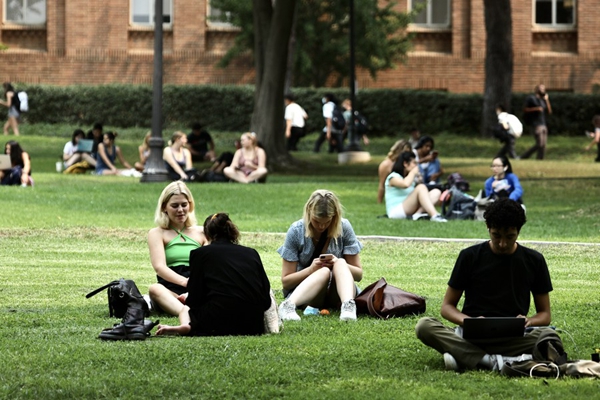

Students are seen on campus of the University of California, Los Angeles (UCLA), in Los Angeles, the United States, Sept. 23, 2021. [Photo/Xinhua]
The United States Supreme Court is set to consider in two pending cases whether the country's colleges may continue to use race as a factor in student admissions. The decision may change the future of affirmative action policy, introduced to redress historic discrimination, in higher education.
A study released on March 28 by Georgetown University Center on Education and the Workforce warns that racial and ethnic diversity on university campuses could decline even if the institutions give more weight to factors, such as the socio-economic class of applicants.
"Without race-conscious admissions, the role selective colleges play in creating equal opportunity in our society is likely to diminish," said Zack Mabel, co-author of the study.
According to the study titled "Race-Conscious Affirmative Action: What's Next," colleges would have to "fundamentally alter their admissions practices" to achieve diversity, particularly among Blacks, Hispanics and Indigenous students, if the Supreme Court bans affirmative action in college admissions.
According to the study, an alternative admissions process that includes socio-economic status would achieve a high level of racial and ethnic diversity if colleges eliminate preferences for legacy applicants, student athletes, those with ties to donors and other such factors that mostly benefit White, affluent applicants.
About 60 percent of top U.S. colleges consider race as a factor in admissions, according to 2015 estimates.
In addition, schools would have to expand their recruitment of high school students from disadvantaged backgrounds for a class-based alternative to produce a similar outcome to race-conscious admissions, the study found.
In 2022, the high court heard two cases that had arguments challenging affirmative action admission policies at Harvard University and the University of North Carolina that use race and ethnicity among other factors.
In the case at Harvard University, the group named Students for Fair Admissions accused the school of holding Asian-American students to a higher educational standard than it did African American or Hispanic students.
According to experts, if the U.S. Supreme Court rules against the colleges, the landscape of college admissions would change drastically, and many schools fear losing what they have gained in diversity over the years.
